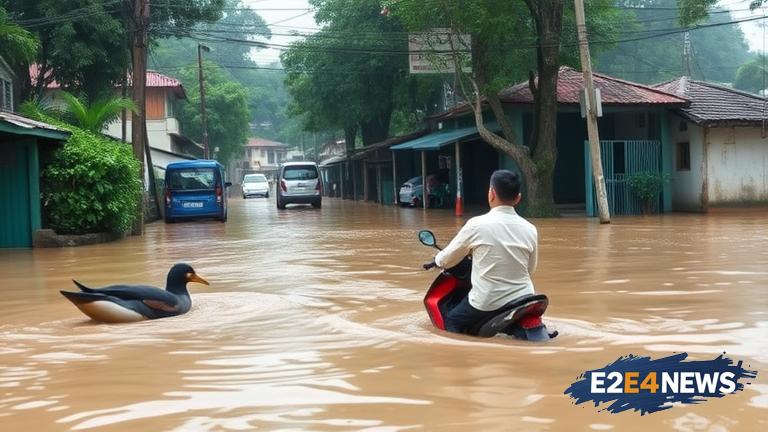Typhoon Kajiki has brought severe weather conditions to central Vietnam, causing widespread flooding and damage to infrastructure. The storm made landfall on Tuesday, bringing with it heavy rains and strong winds that have resulted in at least 3 deaths. The affected areas include the provinces of Quang Ngai, Quang Nam, and Da Nang, where thousands of homes have been inundated with floodwaters. The flooding has also disrupted transportation, with many roads and highways rendered impassable. The Vietnamese government has deployed emergency responders and aid workers to the affected areas, with a focus on providing food, shelter, and medical care to those in need. The storm has also caused significant damage to crops and livestock, with many farmers reporting losses. The full extent of the damage is still being assessed, but it is clear that the storm has had a devastating impact on the region. The Vietnamese military has been deployed to assist with relief efforts, with troops helping to evacuate stranded residents and distribute aid. The government has also established a hotline for people to report damage and request assistance. The storm has highlighted the need for improved disaster preparedness and response in Vietnam, where typhoons are a regular occurrence. The country’s central region is particularly vulnerable to typhoons, which can bring heavy rains and strong winds. The government has pledged to provide support to affected communities, including financial assistance and aid. The international community has also offered assistance, with several countries and organizations pledging to provide aid and support. The storm has also raised concerns about the impact of climate change on Vietnam, where rising sea levels and more frequent natural disasters are becoming increasingly common. The government has vowed to take steps to mitigate the effects of climate change, including investing in infrastructure and disaster preparedness. The storm has also disrupted economic activity in the region, with many businesses forced to close due to the flooding. The tourism industry has also been affected, with many visitors forced to cancel their plans due to the weather. The government has urged people to remain calm and to follow evacuation orders, as the situation is being closely monitored. The storm has also highlighted the importance of disaster preparedness and response, with many residents taking steps to protect themselves and their properties. The government has also established a fund to support affected communities, with donations being accepted from individuals and organizations. The storm has brought the community together, with many people coming out to help with relief efforts. The government has thanked the public for their support and urged people to continue to follow safety instructions. The situation is being closely monitored, with updates being provided regularly. The government has also warned of the risk of landslides and flash flooding, and has urged people to exercise caution when traveling. The storm has been downgraded to a tropical depression, but the risk of flooding and landslides remains high. The government has urged people to remain vigilant and to follow safety instructions, as the situation continues to evolve.





